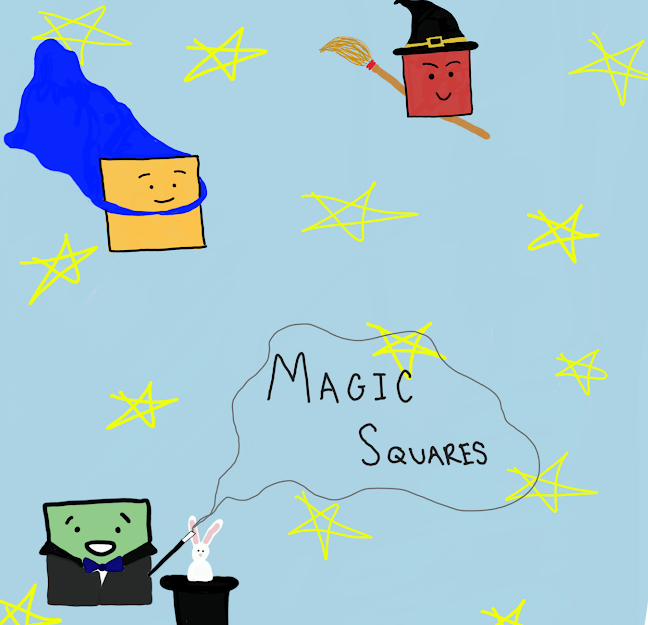
(Cover Artist: Delilah Friedman)
What is a magic square?

A magic square is a square arrangement of numbers, in which the sum of the numbers in each row, column and diagonal are the same.
Each box within a magic square is called a “cell”, and the order of a magic square is the length of the edge. So, a 3x3 magic square would have an order of 3.
The magic constant is the number that each row, column or diagonal sums to. The formula for the magic constant is n(n2+1)2, where n is the order, and the magic constant for a 3x3 magic square would be 15.
History
Magic squares were first noted in a Chinese myth from around 2200 BC. The old Chinese myth is a story of Emperor Yu, who discovered a magic square carved onto the shell of a tortoise swimming in the Yellow River. The Chinese named the magic square of order 3 “Lo Shu”.
Magic squares are also found in pieces of art throughout history. For example, magic squares are found in the Passion Facade of the Sagrada Familia cathedral in Barcelona.
Solving Magic Squares of an Odd Order (n)
The first method introduced in this article is called the Siamese method, or De la Loubère method:

Place the number 1 in the middle cell of the top row
Fill in the numbers 2, 3, … n2 in sequential order - the next number is placed in the cell 1 to the right and 1 up from the previous cell
If the number goes off the grid, imagine another magic square of order n, and place the number in the real magic square where it is in the imaginary magic square
Referring to the figure on the right, the 2 is placed in the imaginary square, then transferred onto the real square
*If a box is already filled, move 1 square down
This second method is a variation of the Siamese method:

On each edge of the square, draw n-2 cells
Then, start filling in the numbers 1, 2, … n2 in diagonals of length n from the bottom left to top right (refer to the image to the left)
Rearrange the numbers within the added cells into the horizontally furthest open cell (refer to the image to the right)
Note how the 1 on the left hand side fills in the empty cell on the right
Applications of Magic Squares
Magic squares are a fun way to practice addition but can also be used as challenging math puzzles, especially in competition math. Besides this, magic squares have been used to study artificial intelligence and variance designs.
Sample Magic Square
Try out this sample magic square, of order 5!

Sources for Further Reading
Comments